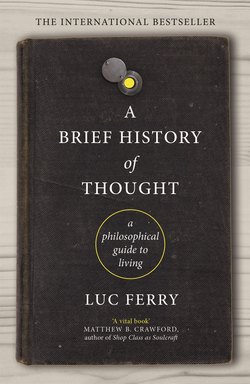Читать книгу A Brief History of Thought - Luc Ferry - Страница 19
На сайте Литреса книга снята с продажи.
The Burden of the Past and the Mirages of the Future
ОглавлениеLet us begin with the essentials: in the eyes of the Stoics, the two great ills which prevent us from achieving fulfilment are nostalgia and hope, specifically attachment to the past and anxiety about the future. These block our access to the present moment, and prevent us from living life to the full. It has been said that Stoicism here anticipated one of the most profound insights of psychoanalysis: that he who remains the prisoner of his past will always be incapable of ‘acting and enjoying’, as Freud said; that the nostalgia for lost paradises, for the joys and sorrows of childhood, lays upon our lives a weight as heavy as it is unknown to us.
Marcus Aurelius expresses this conviction, perhaps better than anyone else, at the beginning of Book XII of his Meditations:
It is in your power to secure at once all the objects which you dream of reaching by a roundabout route, if you will be fair to yourself: if you will leave all the past behind, commit the future to Providence, and direct the present alone, towards piety and justice. To piety, so that you may be content with what has been assigned to you – for Nature designed it for you and you for it; to justice, that you may freely and without circumlocution speak the truth and do those things that are in accord with law and in accord with the worth of each. (XII.1)
To be saved, to attain the wisdom that surpasses all philosophy, we must school ourselves to live without vain fears or pointless nostalgias. Once and for all we must stop living in the dimensions of time past and time future, which do not exist in reality, and adhere as much as possible to the present:
Do not let your picture of the whole of your life confuse you, do not dwell upon all the manifold troubles which have come to pass and will come to pass; but ask yourself in regard to every passing moment: what is there here that cannot be borne and cannot be endured? Then remind yourself that it is not the future or the past that weighs heavy upon you, but always the present, and that this gradually grows less. (Meditations, VIII, 36)
Marcus Aurelius is quite insistent on this point: ‘Remember that each of us lives only in the present moment, in the instant. All the rest is the past, or an uncertain future. The extent of life is therefore brief.’ This is what we must confront. Or as Seneca expresses it, in the Letters to Lucilius: ‘You must dispense with these two things: fear of the future, and the recollection of ancient ills. The latter no longer concerns me, the former has yet to concern me.’ To which one might add, for good measure, that it is not only ‘ancient ills’ that spoil the present life of the unwise, but perversely and perhaps to a greater degree, the recollection of happy days irrevocably lost and which will return ‘never more’.
If should now be clear why, paradoxically (and contrary to popular opinion), Stoicism would teach its disciples to part ways with those ideologies that promote the virtue of hope.
